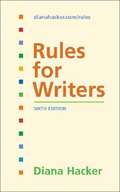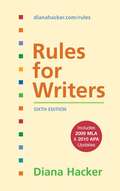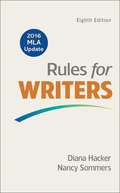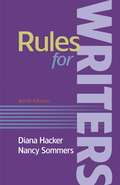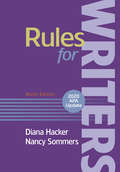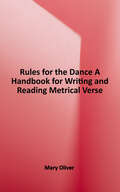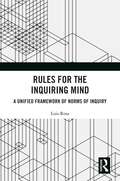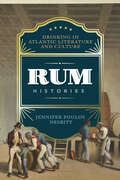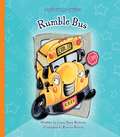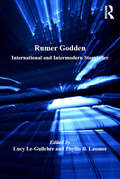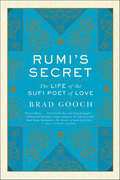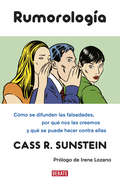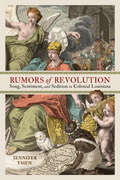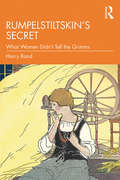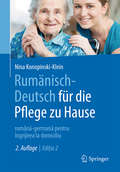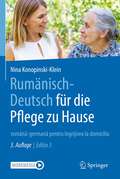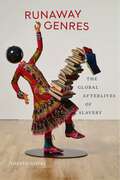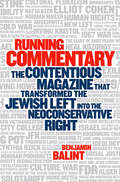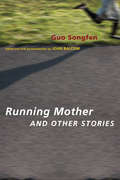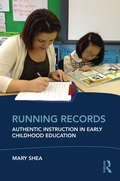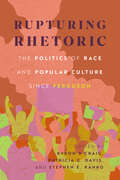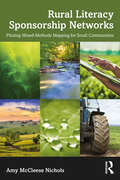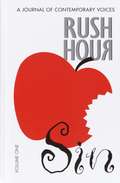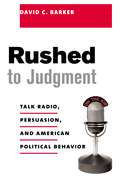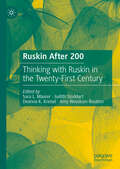- Table View
- List View
Rules for Writers (Sixth Edition)
by Diana HackerCollege guidebook to writing, research and grammar rules.
Rules for Writers (Sixth Edition), Includes 2009 MLA & 2010 APA Updates
by Diana Hacker Nancy Sommers Tom Jehn Jane RosenzweigRules for Writers succeeds because it has always been grounded in classroom experience. By looking at her own students' needs, Diana Hacker created an affordable and practical classroom tool that doubles as a quick reference. Developed with the help of instructors from two- and four-year schools, the sixth edition gives students quick access to the information they need to solve writing problems in any college course.
Rules for Writers with 2016 MLA Update Eighth Edition
by Diana Hacker Nancy SommersTHIS TITLE HAS BEEN UPDATED TO REFLECT THE 2016 MLA UPDATES! Our editorial team has updated this text based on content from The MLA Handbook, 8th Edition. Nancy Sommers has woven a new emphasis on reading critically throughout the first section of the handbook, introduced advice for analyzing multimodal texts, and added help for public speaking. New practical Writing Guides support students working through college assignments in a variety of genres. And new peer review advice helps students effectively comment on drafts and apply feedback to revisions of their own work. and rubrics from their peers.
Rules for Writers with Writing About Literature
by Diana Hacker Nancy SommersBeginning college writers come from a wide range of backgrounds and communities. And for many, academic reading and writing skills are ones they must learn and practice. Enter Rules for Writers. It's an easy-to-use, comprehensive composition tool with the quality you expect from authors you trust. It empowers students by teaching them how to meet new expectations and by giving them the practice that builds confidence. With trusted advice for writing well, reading critically, and working with sources, Rules for Writers now has even more help for underprepared and inexperienced writers--sentence guides that foster an academic voice, tips for spotting fake news and misleading sources, more on paraphrasing, and fifteen new "how-to" pages that offer practical help for writing challenges. It's an affordable solution with significant value, especially when paired with LaunchPad Solo for Hacker Handbooks, an innovative practice solution available at no additional cost when package with a new text. With Rules for Writers, you're giving students more for their money, more ways to succeed, and more support than ever to help them meet the challenges of college writing--no matter what their background.
Rules for Writers with Writing About Literature
by Diana Hacker Nancy SommersBeginning college writers come from a wide range of backgrounds and communities. And for many, academic reading and writing skills are ones they must learn and practice. Enter Rules for Writers. It’s an easy-to-use, comprehensive composition tool with the quality you expect from authors you trust. It empowers students by teaching them how to meet new expectations and by giving them the practice that builds confidence. With trusted advice for writing well, reading critically, and working with sources, Rules for Writers now has even more help for underprepared and inexperienced writers—sentence guides that foster an academic voice, tips for spotting fake news and misleading sources, more on paraphrasing, and fifteen new “how-to” pages that offer practical help for writing challenges. It’s an affordable solution with significant value, especially when paired with LaunchPad Solo for Hacker Handbooks, an innovative practice solution available at no additional cost when package with a new text. With Rules for Writers, you’re giving students more for their money, more ways to succeed, and more support than ever to help them meet the challenges of college writing—no matter what their background.
Rules for the Dance: A Handbook For Writing And Reading Metrical Verse
by Mary OliverTrue ease in writing comes from art, not chance, / As those move easiest who have to learn to dance," wrote Alexander Pope. "The dance," in the case of Oliver's brief and luminous book, refers to the interwoven pleasures of sound and sense to be found in some of the most celebrated and beautiful poems in the English language, from Shakespeare to Edna St. Vincent Millay to Robert Frost. With a poet's ear and a poet's grace of expression, Oliver shows what makes a metrical poem work - and enables readers, as only she can, to "enter the thudding deeps and the rippling shallows of sound-pleasure and rhythm-pleasure that intensify both the poem's narrative and its ideas."
Rules for the Inquiring Mind: A Unified Framework of Norms of Inquiry
by Luis RosaThis book concerns the nature and the norms of inquiry. It tackles not only philosophical issues regarding what inquiry is, but also issues regarding how it should and should not be executed. Roughly put, inquiry is the activity of searching for the true answers to questions of our interest. But what is the difference between empirical and armchair inquiry? And what are the right and the wrong ways to inquire? Under what conditions should one start inquiring? Which questions are such that one should not inquire into them? The book offers answers to these questions. It argues that competent armchair inquiry only makes explicit what was already implicit—the inquirer already had the answer to her question before inquiring into it, though this was not explicit to her. It also argues that we should avoid inquiring into questions whose answers are unknowable to us, in the instrumental sense of 'should', and that different modes of inquiry are called for, depending on which type of information is available to the subject. These answers are rigorously argued for, and they stem from a unified framework for modeling the activity of inquiry.
Rum Histories: Drinking in Atlantic Literature and Culture (New World Studies)
by Jennifer Poulos NesbittWhen you drink rum, you drink history. More than merely a popular spirit in the transatlantic, rum became a cultural symbol of the Caribbean. While rum is often dismissed as set dressing in texts about the region, the historical and moral associations of alcohol generally—and rum specifically—cue powerful stereotypes, from touristic hedonism to social degeneracy. Rum Histories examines the drink in anglophone Atlantic literature in the period of decolonization to complicate and elevate the symbolic currency of a commodity that in fact reflects the persistence of colonialism in shaping the material and mental lives of postcolonial subjects.As a product of the plantation and as an intoxicant, rum was a central lubricant of the colonial economy as well as of cultural memory. Discussing a wide spectrum of writing, from popular contemporary works such as Christopher Moore’s Fluke and Joseph O’Neill’s Netherland to classics by Michelle Cliff, V. S. Naipaul, and other luminaries of the Caribbean diaspora, Jennifer Nesbitt investigates how rum’s specific role in economic exploitation is muddled by moral attitudes about the consequences of drinking. The centrality of alcohol use to racialized and gendered norms guides Nesbitt’s exploration of how the global commodities trade connects disparate populations across history and geography. This innovative study reveals rum’s fascinating role in expressing the paradox of a postcolonial world still riddled with the legacies of colonialism.This book is freely available in an open access edition thanks to TOME (Toward an Open Monograph Ecosystem)—a collaboration of the Association of American Universities, the Association of University Presses, and the Association of Research Libraries—and the generous support of the Pennsylvania State University.New World Studies
Rumble Bus
by Larry Dane BrimnerPassengers get on and off the bus, providing a lesson in addition and subtraction.
Rumer Godden: International and Intermodern Storyteller
by Lucy Le-GuilcherFrom 1929 to 1997, Rumer Godden published more than 60 books, including novels, biographies, children's books, and poetry; this is the first collection devoted to this important transnational writer. Focusing on Godden's writing from the 1930s onward, the contributors uncover the breadth and variety of the literary landscape on display in works such as Black Narcissus, The Lady and the Unicorn, A Fugue in Time, and The River. Often drawing on her own experiences living in India and Britain, Godden establishes a diverse narrative topography that allows her to engage with issues related to her own uncertain position as an author representing such nomadic Others as gypsies, or taking up the displacements brought about by international conflict. Recognizing that studies of the transnational must consider the condition of enforced and elected exile within the changing political and cultural borders of postcolonial nations, the contributors position Godden with respect to different and overlapping fields of inquiry: modern literary history; colonial, postcolonial, and transnational studies; inter-media studies; and children's literature. Taken together, the essays in this volume demonstrate the richness and variety of Godden's writing and render the myriad ways in which Godden is an important critical presence in mid-twentieth-century fiction.
Rumi's Secret: The Life of the Sufi Poet of Love
by Brad GoochA biography of the Sufi poet that’s “a dazzling feat of scholarship . . . the book restores Rumi to the glories and hardships of his momentous age” (The Washington Post).Ecstatic love poems of Rumi, a Persian poet and Sufi mystic born over eight centuries ago, are beloved by millions of readers in America as well as around the world. He has been compared to Shakespeare for his outpouring of creativity and to Saint Francis of Assisi for his spiritual wisdom. Yet his life has long remained the stuff of legend rather than intimate knowledge.In this breakthrough biography, New York Times–bestselling author Brad Gooch brilliantly brings to life the man and puts a face to the name Rumi, vividly coloring in his time and place—a world as rife with conflict as our own. The map of Rumi’s life stretched over 2,500 miles. Gooch traces this epic journey from Central Asia, where Rumi was born in 1207, traveling with his family, displaced by Mongol terror, to settle in Konya, Turkey. Pivotal was the disruptive appearance of Shams of Tabriz, who taught him to whirl and transformed him from a respectable Muslim preacher into a poet and mystic. Their vital connection as teacher and pupil, friend and beloved, is one of the world’s greatest spiritual love stories. When Shams disappeared, Rumi coped with the pain of separation by composing joyous poems of reunion, both human and divine.Ambitious, bold, and beautifully written, Rumi’s Secret reveals the unfolding of Rumi’s devotion to a “religion of love,” remarkable in his own time and made even more relevant for the twenty-first century by this compelling account.
Rumorología: Cómo se difunden las falsedades, por qué las creemos y qué hacer contra ellas
by Cass R. SunsteinCómo se difunden falsedades en la era de Internet, por qué nos las creemos y qué se puede hacer. ¿Por qué los seres humanos aceptan los rumores, incluso si son falsos, destructivos o estrambóticos? ¿Por qué la misma historia que viaja por Internet tiene credibilidad entre un grupo de personas, mientras que otros la consideran absurda? ¿Qué podemos hacer para protegernos de los efectos perniciosos de los rumores falsos? Los rumores son tan antiguos como la historia humana; siempre hemos vivido rodeados de ellos o incluso sufrido sus consecuencias. Del mismo modo que a través del conocimiento de otros sabemos que la tierra no es plana o que la materia se compone de átomos, los rumores se propagan entre todo tipo de personas -sensatas, razonables, de izquierdas o derechas-, y están ligados a sus deseos y temores. El derecho de los ciudadanos a decir lo que piensan constituye uno de los pilares de los sistemas democráticos en que vivimos, y sin embargo, en la era de Internet, donde uno de estos bulos puede crecer exponencialmente en tan solo unas horas, es fundamental proteger a las posibles víctimas de comportamientos maldicientes. Ayudado por ejemplos de la vida real y estudios de la conducta, Sunstein aborda la compleja tarea de analizar los mecanismos que alimentan los rumores para tratar de encontrar ese equilibrio indispensable entre la necesidad de protegernos de ellos y la salvaguarda de derechos como la libertad de prensa y opinión, y así evitar que la era de la información termine convirtiéndose en la era de la desinformación.
Rumors of Revolution: Song, Sentiment, and Sedition in Colonial Louisiana (Writing the Early Americas)
by Jennifer TsienIn 1682 the French explorer René-Robert Cavelier de La Salle claimed the Mississippi River basin for France, naming the region Louisiana to honor his king, Louis XIV. Until the United States acquired the territory in the Louisiana Purchase more than a century later, there had never been a revolution, per se, in Louisiana. However, as Jennifer Tsien highlights in this groundbreaking work, revolutionary sentiment clearly surfaced in the literature and discourse both in the Louisiana colony and in France with dramatic and far-reaching consequences.In Rumors of Revolution, Tsien analyzes documented observations made in Paris and in New Orleans about the exercise of royal power over French subjects and colonial Louisiana stories that laid bare the arbitrary powers and abuses that the government could exert on its people against their will. Ultimately, Tsien establishes an implicit connection between histories of settler colonialism in the Americas and the fate of absolutism in Europe that has been largely overlooked in scholarship to date.
Rumpelstiltskin’s Secret: What Women Didn’t Tell the Grimms
by Harry RandEveryone knows Rumpelstiltskin's story—or thinks they do. We heard it as children. We might affectionately remember the adult voices reciting the tale or recall the light in the room and the time of day when we enjoyed hearing this scripted performance. A grown-up's voice added roughness and pitch to mimic the characters, to murmur tension-filled passages, to pause drawing out the suspense between the Queen's guesses. Maybe the storyteller's voice finally rose to exult when shouting the discovered name or, drawing close, whispered it malevolently. Those long-ago readers intended to enchant us, sometimes to put us to sleep, and for a while we delighted in this magical performance. Then we grew up: obligated to attend to an adult's endless travails, we forgot little Rumpelstiltskin. But he eventually returned. Years later we told this story to our children joining a parade of generations stretching back—no one knows how far. We voluntarily enrolled in a long procession that greys toward the back of the line, blurred, nameless, and wispy before the figures pale translucent and finally become invisible. We became merely the foremost reciters of a tale whose narration enrolled us in a club whose rules we think we know, but don't really. This tale may count among the world's oldest dirty jokes. The punchline misplaced, over time its wickedly funny insights about adult life passed for childish nonsense.
Rumänisch-Deutsch für die Pflege zu Hause: română-germană pentru îngrijirea la domiciliu
by Nina Konopinski-KleinRumänisch/Deutsch, Deutsch/Rumänisch - Wörterbuch für rumänische Pflegende, Senioren und Angehörige:Eine große Herausforderung für viele rumänische Pflegekräfte im deutschsprachigen Raum ist die Verständigung im Alltag der häuslichen Pflege. Dieser einfache Sprachführer ist ein unverzichtbarer Helfer im direkten Gespräch. Begriffe und einfache Sätze aus dem Alltag werden in beiden Sprachen angeführt und erleichtern die Kommunikation zwischen allen Beteiligten. Häufig verwendete Vokabeln, medizinische Fachwörter und einfache Dialoge werden zu Alltagsthemen zusammengetragen, wie z.B.: Körperhygiene, Haushalt, der menschliche Körper, Wohlbefinden, Arztbesuch, Gesundheit und Krankheit, Ernährung. Zahlreiche Abbildungen unterstützen ebenfalls das Einander-Verstehen.Für rumänische Pflegekräfte, die in Deutschland, Österreich oder in der Schweiz arbeiten, Vermittlungsagenturen und Arbeitgeber im Gesundheitswesen, die mit slowakischen Fachkräften zusammenarbeiten. Aber auch Senioren und Angehörige, die dankbar sind über die Unterstützung im häuslichen Umfeld, finden in diesem Alltagswörterbuch eine wirklich praktische Hilfe.
Rumänisch-Deutsch für die Pflege zu Hause: română-germană pentru îngrijirea la domiciliu
by Nina Konopinski-KleinSprachführer für den PflegealltagDieses übersichtliche Wörterbuch ist ein unverzichtbarer Helfer im Gespräch. Begriffe und einfache Sätze aus dem Alltag werden in beiden Sprachen aufgeführt und erleichtern die Verständigung im Alltag. Einfache Dialoge zu Alltagsthemen wie z.B. Wohlbefinden, Krankheit, Arztbesuch, Haushalt, und Ernährung. Neu in der dritten Auflage sind Podcasts zum Anhören und Lernen! Aber auch wichtige Fachbegriffe aus der Pflege werden erläutert. Zahlreiche Abbildungen unterstützen das Gespräch und hilfreiche Vokabellisten erleichtern das Lernen neuer Wörter.Empfehlenswert für rumänische Pflegekräfte und Haushaltshilfen, die in Deutschland, Österreich oder in der Schweiz arbeiten; aber auch Senioren und Angehörige finden darin Hilfen zum Gespräch.Ghid lingvistic pentru activitatea de îngrijire zilnică Acest dicționar clar prezentat este un ajutor indispensabil în conversație. Termenii și frazele simple din viața de zi cu zi sunt enumerate în ambele limbi și facilitează comunicarea în viața cotidiană. Dialoguri simple pe teme cotidiene precum bunăstarea, boala, vizitele la medic, gospodăria și alimentația. Nou în cea de-a treia ediție sunt podcast-uri pentru a asculta și a învăța! Dar sunt explicați și termeni tehnici importanți din domeniul îngrijirii. Numeroase ilustrații susțin conversația, iar listele de vocabular utile facilitează învățarea cuvintelor noi. Recomandat pentru îngrijitorii și menajerele din România care lucrează în Germania, Austria sau Elveția, dar și pentru persoanele în vârstă și rudele acestora vor găsi un interlocutor.
Runaway Genres: The Global Afterlives of Slavery
by Yogita GoyalWinner, 2021 René Wellek Prize, given by the American Comparative Literature AssociationWinner, 2021 Barbara Perkins and George Perkins Award, given by the International Society for the Study of NarrativeHonorable Mention, 2020 James Russell Lowell Prize, given by the Modern Language AssociationArgues that the slave narrative is a new world literary genre In Runaway Genres, Yogita Goyal tracks the emergence of slavery as the defining template through which current forms of human rights abuses are understood. The post-black satire of Paul Beatty and Mat Johnson, modern slave narratives from Sudan to Sierra Leone, and the new Afropolitan diaspora of writers like Teju Cole and Chimamanda Ngozi Adichie all are woven into Goyal’s argument for the slave narrative as a new world literary genre, exploring the full complexity of this new ethical globalism. From the humanitarian spectacles of Kony 2012 and #BringBackOurGirls through gothic literature, Runaway Genres unravels, for instance, how and why the African child soldier has now appeared as the afterlife of the Atlantic slave.Goyal argues that in order to fathom forms of freedom and bondage today—from unlawful detention to sex trafficking to the refugee crisis to genocide—we must turn to contemporary literature, which reveals how the literary forms used to tell these stories derive from the antebellum genre of the slave narrative. Exploring the ethics and aesthetics of globalism, the book presents alternative conceptions of human rights, showing that the revival and proliferation of slave narratives offers not just an occasion to revisit the Atlantic past, but also for re-narrating the global present. In reassessing these legacies and their ongoing relation to race and the human, Runaway Genres creates a new map with which to navigate contemporary black diaspora literature.
Running Commentary: The Contentious Magazine that Transformed the Jewish Left into the Neoconservative Right
by Benjamin BalintIn the years of cultural and political ferment following World War II, a new generation of Jewish- American writers and thinkers arose to make an indelible mark on American culture. Commentary was their magazine; the place where they and other politically sympathetic intellectuals-Hannah Arendt, Saul Bellow, Lionel Trilling, Alfred Kazin, James Baldwin, Bernard Malamud, Philip Roth, Cynthia Ozick and many others-shared new work, explored ideas, and argued with each other. Founded by the offspring of immigrants, Commentary began life as a voice for the marginalized and a feisty advocate for civil rights and economic justice. But just as American culture moved in its direction, it began-inexplicably to some-to veer right, becoming the voice of neoconservativism and defender of the powerful. This lively history, based on unprecedented access to the magazine’s archives and dozens of original interviews, provocatively explains that shift while recreating the atmosphere of some of the most exciting decades in American intellectual life.
Running Mother and Other Stories (Modern Chinese Literature from Taiwan)
by Songfen GuoGuo Songfen's short stories are masterful psychological portraits that play with the echoes of history and the nature of identity. One of the few modernists to truly capture the fallout from such events as the February 28th Incident and the White Terror, Guo Songfen illuminates the quiet core of his characters through a spare and immediate style that is at once a symptom and an allegory of the trauma in which they live.In "Running Mother," a man is torn between his fear of abandonment and his guilt over leaving his family, and therefore his symbolic home, behind. "Moon Seal" follows a woman caught between traditional and modern worlds. In "Wailing Moon," a wife learns a shocking secret after her husband's death, realizing he was never the man she thought him to be. Set in the United States and Taiwan, "Snow Blind" is a multigenerational triptych that portrays the consequences of spiritual malaise, and in "Brightly Shines the Stars Tonight," a general wrestles with issues of memory and self-perception in the final moments before his execution. Guo Songfen's stories play with the hazards of miscommunication, the malevolence of human will, the arbitrary nature of fate, and the burden of historical circumstance. As the general discovers, life is a game of chess, the outcome of which is never certain though it might be logically designed. Showcasing the best of Taiwan's modernist style, these stories are not only an indictment of the human condition but also a powerful comment on the experience of postretrocession Taiwan.
Running Records: Authentic Instruction in Early Childhood Education
by Mary SheaThe most effective way to understand what a child knows about the reading process is to take a running record. In Running Records, Mary Shea demonstrates how teachers can use this powerful tool to design lessons that decrease reading difficulties, build on strengths, and stimulate motivation, ensuring that children develop self-sustaining learning strategies. Special Features include: a step-by-step outline for taking efficient running records guidance in running record analysis: readers will learn how to use running record data to determine a child’s level of decoding skill, comprehension, fluency, and overall reading confidence a Companion Website offering videos of the running record process, sample running records for analysis, and numerous other resources In order to meet the multi-faceted needs of children in today's classrooms, teachers must be knowledgeable about literacy concepts. Running Records provides that invaluable knowledge, making it an ideal text for literacy courses for pre-service teachers and a key professional reference for in-service teachers.
Rupturing Rhetoric: The Politics of Race and Popular Culture since Ferguson (Race, Rhetoric, and Media Series)
by Byron B Craig, Patricia G. Davis, and Stephen E. RahkoContributions by Maksim Bugrov, Byron B Craig, Patricia G. Davis, Peter Ehrenhaus, Whitney Gent, Christopher Gilbert, Oscar Giner, J. Scott Jordan, Euni Kim, Melanie Loehwing, Jaclyn S. Olson, A. Susan Owen, Stephen E. Rahko, Nick J. Sciullo, Arthur D. Soto-Vásquez, and Erika M. ThomasThe events surrounding the 2014 killing of Michael Brown in Ferguson, Missouri, marked a watershed moment in US history. Though this instance of police brutality represented only the latest amid decades of similar unjust patterns, it came to symbolize state complicity in the deployment of violence to maintain racial order. Rupturing Rhetoric: The Politics of Race and Popular Culture since Ferguson responds to the racial rhetoric of American popular culture in the years since Brown's death. Through close readings of popular media produced during the late Obama and Trump eras, this volume details the influence of historical and contemporary representations of race on public discourse in America.Using Brown’s death and the ensuing protests as a focal point, contributors argue that Ferguson marks the rupture of America’s postracial fantasy. An ideology premised on colorblindness, the notion of the “postracial” suggests that the United States has largely achieved racial equality and that race is no longer a central organizing category in American society. Postracialism is partly responsible for ahistorical, romanticized narratives of slavery, Jim Crow segregation, and American exceptionalism. The legitimacy of this fantasy, the editors contend, was the first casualty of the tanks, tear gas, and rubber bullets wielded against protesters during the summer of 2014. From these protests emerged a new political narrative organized around #BlackLivesMatter, which directly challenged the fantasy of a postracial American society.Essays in Rupturing Rhetoric cover such texts as Fresh Off the Boat; Hamilton; Green Book; NPR’s American Anthem; Lovecraft Country; Disney remakes of Dumbo, The Lion King, and Lady and the Tramp; BlacKkKlansman; Crazy Rich Asians; The Hateful Eight; and Fences. As a unified body of work, the collection interrogates the ways contemporary media in American popular culture respond to and subvert the postracial fantasy underlying the politics of our time.
Rural Literacy Sponsorship Networks: Piloting Mixed-Methods Mapping for Small Communities
by Amy McCleese NicholsThis text provides an in-depth exploration of rural community literacy, examining the ways in which community-building, social networks, time, race, and politics interplay.Mapping the dense literacy sponsorship network of a small rural town in the southeastern United States, Nichols offers a window into the challenges and successes of collective literacy sponsorship. Through an original mapping-focused approach, the book explores multiple social and environmental layers that construct literacy sponsorship writ large.This approach provides a novel methodological entry to rural literacies and will be key reading for rural community literacy advocates, literacy scholars, graduate students, and researchers.
Rush Hour: Sin (A Journal of Contemporary Voices Volume #1)
by Michael CartIntended for teens, Rush Hour tempts readers with 19 stellar contributors interpretations of sin. From the Bible to the big screen, from classrooms to homes, sin is powerful, arresting, and rarely clear-cut.
Rushed to Judgment: Talk Radio, Persuasion, and American Political Behavior (Power, Conflict, and Democracy: American Politics Into the 21st Century)
by David BarkerConvenient, entertaining, and provocative, talk radio today is unapologetically ideological. Focusing on Rush Limbaugh—the medium's most influential talk show—Rushed to Judgment systematically examines the politics of persuasion at play on our nation's radio airwaves and asks a series of important questions. Does listening to talk radio change the way people think about politics, or are listeners' attitudes a function of the self-selecting nature of the audience? Does talk radio enhance understanding of public issues or serve as a breeding ground for misunderstanding? Can talk radio serve as an agent of deliberative democracy, spurring Americans to open, public debate? Or will talk radio only aggravate the divisive partisanship many Americans decry in poll after poll? The time is ripe to evaluate the effects of a medium whose influence has yet to be fully reckoned with.
Ruskin After 200: Thinking with Ruskin in the Twenty-First Century
by Amy Woodson-Boulton Deanna K. Kreisel Sara L. Maurer Judith StoddartThis edited volume offers new models for engaging with the work of John Ruskin, the Victorian art critic, architectural and educational theorist, amateur meteorologist and naturalist who gradually became an outspoken critic of capitalist economics and industrialization’s toll on the environment. Two hundred years after Ruskin’s birth, his relevance to art, literature, history, architecture, economics and natural science has not ebbed. However, the nature of Ruskin’s relevance has evolved considerably. This volume offers a cross-section of current scholarship, showing how a range of scholars continue to engage with Ruskin’s work in their research. The chapters provide a snapshot both of what scholars need from Ruskin now and how they continue to develop methodologies that allow them to keep in honest conversation with his writing – work that is wide-ranging, visionary and nuanced, but also elusive, promiscuously mixing the symbolic and scientific, and at times, deeply marred by the shortcomings of sexism, racism and rigid hierarchical thinking.
